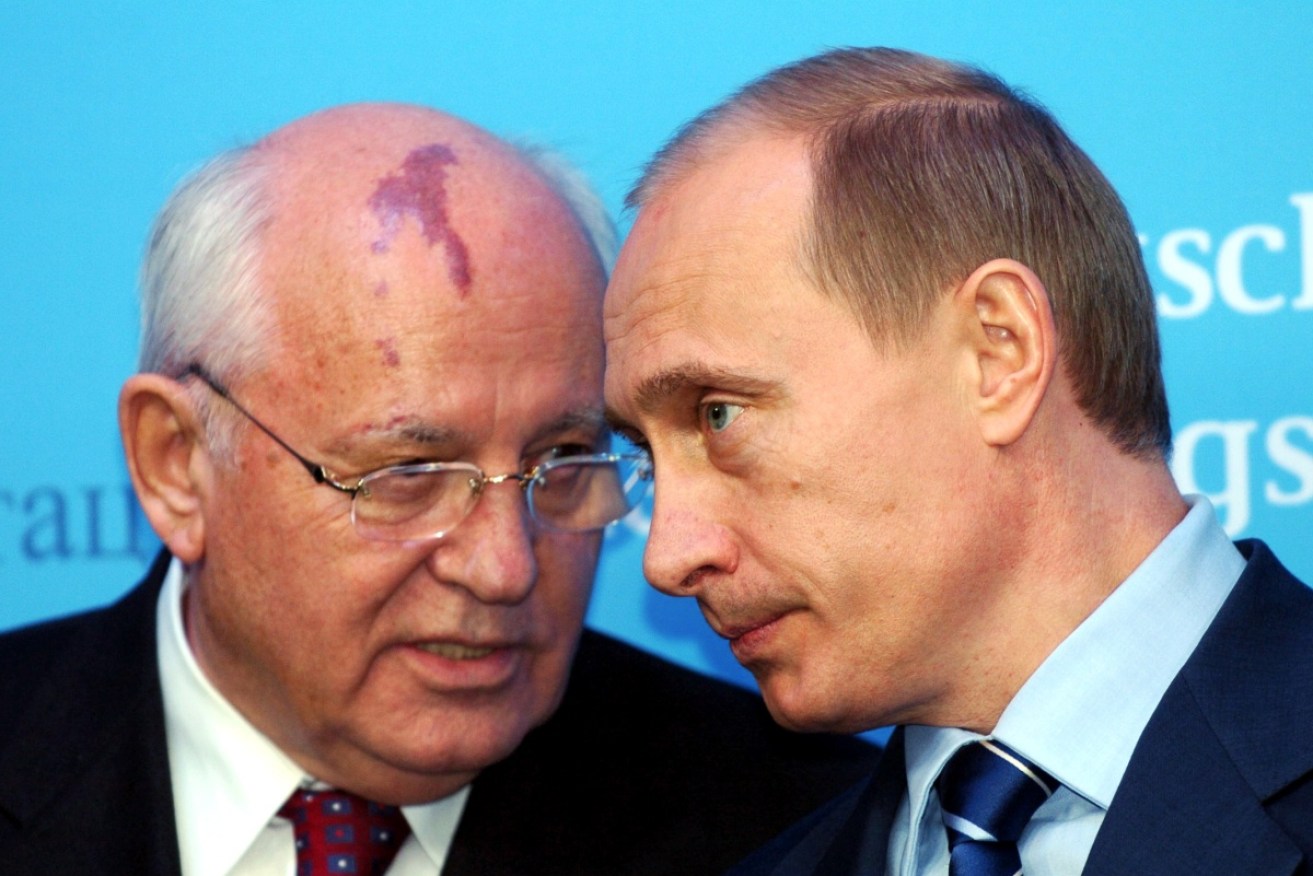Putin’s shock move on Gorbachev funeral


Mr Gorbachev and Mr Putin together in 2004. Photo: Getty
Russian President Vladimir Putin will miss the funeral of the last Soviet leader, Mikhail Gorbachev, because of schedule constraints, the Kremlin says.
Kremlin spokesman Dmitry Peskov said Putin had paid his respects on Thursday morning by visiting and laying a wreath at Moscow’s Central Clinical Hospital, where Mr Gorbachev died on Tuesday.
“Unfortunately, the president’s work schedule will not allow him to do this on [Saturday] September 3, so he decided to do it today,” Mr Peskov said.
He added that Mr Gorbachev’s funeral would have “elements” of a state funeral, including a guard of honour, and that the state was helping to organise it. But the former leader has been denied a full state funeral.
Russian officials and MPs are treading carefully while reacting to Mr Gorbachev’s death, praising him for his role in ending the Cold War but deploring his failure to avert the collapse of the Soviet Union.
The stance was reflected by state television broadcasts, which paid tribute to Mr Gorbachev as a historic figure but described his reforms as poorly planned and held him responsible for failing to safeguard the country’s interests in dialogue with other world powers.
The criticism echoed earlier assessments by Mr Putin, who has famously lamented the collapse of the Soviet Union as the “greatest geopolitical catastrophe of the 20th century”.
In a telegram of condolences released by the Kremlin this week, Mr Putin praised Mr Gorbachev as a man who left “an enormous impact on the course of world history”.
“He led the country during difficult and dramatic changes, amid large-scale foreign policy, economic and society challenges,” he said.
“He deeply realised that reforms were necessary and tried to offer his solutions for the acute problems.”
Mr Peskov described Mr Gorbachev as an “extraordinary” statesman who will “always remain in the country’s history”.
“Gorbachev has given an impulse to ending the Cold War and he sincerely wanted to believe that it will be over and a new romantic period will start between the renewed Soviet Union and the collective West,” he said.
“Those romantic expectations failed to materialise. The bloodthirsty nature of our opponents has come to light, and it’s good that we realised that in time.”
While avoiding explicit personal criticism of Mr Gorbachev, Putin in the past repeatedly blamed him for failing to secure written commitments from NATO that would rule out its expansion eastward – an issue that fomented tensions that exploded when the Russian leader sent troops into Ukraine on February 24.
Members of the Kremlin-controlled parliament sought followed a similar path, hailing Mr Gorbachev’s historic role but lamenting the Soviet collapse.
Leonid Slutsky, the head of the foreign affairs committee in the lower house, the State Duma, hailed Mr Gorbachev as “the most remarkable politician of his time” but described him as a “contradictory” figure whose reforms “played into the hands of those who were trying to wipe the USSR off the world’s map”.
Sergei Mironov, the leader of the Just Russia party, noted that Mr Gorbachev “was like a breath of fresh air, embodying the hopes for colossal changes” but added that his policies led to “the loss of a great country” and became a “tragedy for generations of Russians”.
Some others were far less polite.
Oleg Morozov, a member of the main Kremlin party United Russia, said that Mr Gorbachev should have “repented” for the errors that hurt Russia’s interests.
“There is a mystical coincidence in Gorbachev passing away at a time when the special military operation is in Ukraine,” Mr Morozov said in remarks carried by the state RIA Novosti news agency.
“He was a willing or an unwilling co-author of the unfair world order that our soldiers are now fighting on the battlefield.”
Nikolai Kolomeitsev, the deputy head of the Communist faction in the Duma, went even further, denouncing Mr Gorbachev as a “traitor” who “destroyed the state”.
On another flank, Grigory Yavlinsky, the leader of the liberal Yabloko party, praised Mr Gorbachev for “offering freedom to hundreds of millions in Russia, its neighbourhood and half of Europe”.
“It’s our responsibility how we in Russia have used that freedom, that great opportunity,” he said.
Mr Gorbachev’s aides were devastated by the loss.
“His fearlessness, his initiatives in those changes that he started in this country, our country, in the Soviet Union, in Russia, pre-determined the irreversibility of many of these changes,” said Pavel Palazhchenko, who was Mr Gorbachev’s official interpreter when he was Soviet leader and then worked for Mr Gorbachev’s foundation.
“Not everything was successful, of course, to our great regret, much was trampled on,” he told the Associated Press.
“But I think that this was the project that will definitely be revived.”
Vladimir Polyakov, Mr Gorbachev’s press secretary for three decades, described working alongside him as “the best years”.
Mr Gobachev will be buried on Saturday at Moscow’s Novodevichy cemetery next to his wife.
Mr Gorbachev’s daughter, Irina, told the Interfax news agency that a farewell ceremony would be held at the House of the Unions, a historic mansion near the Kremlin used as the venue for state funerals since Soviet times.
-with AAP








